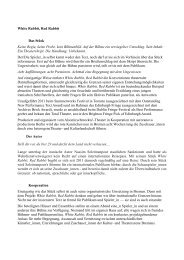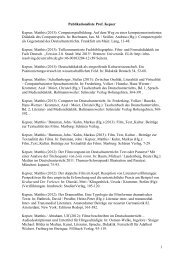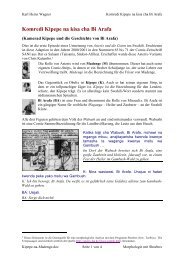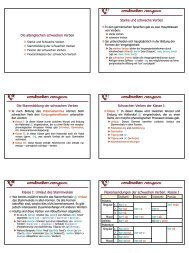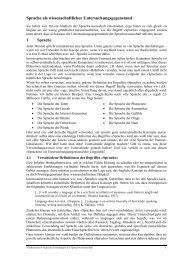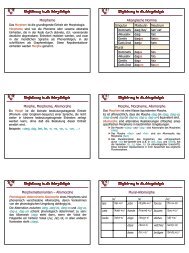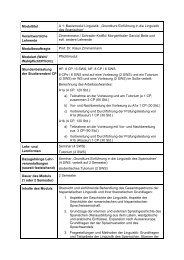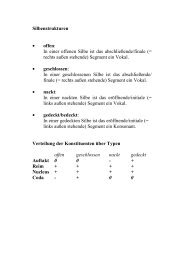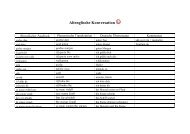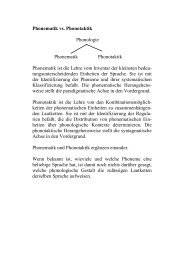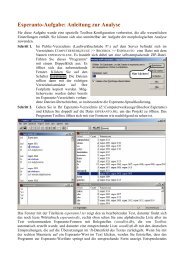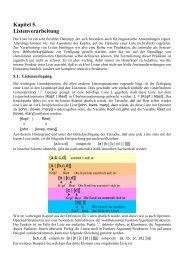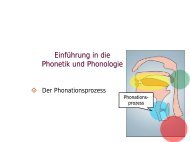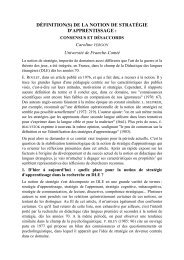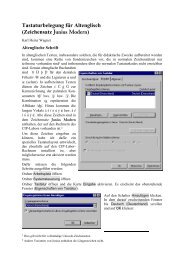Relativism and Universalism in Linguistics - Fachbereich 10 ...
Relativism and Universalism in Linguistics - Fachbereich 10 ...
Relativism and Universalism in Linguistics - Fachbereich 10 ...
You also want an ePaper? Increase the reach of your titles
YUMPU automatically turns print PDFs into web optimized ePapers that Google loves.
144 Workshops<br />
Aspect choice is relevant also <strong>in</strong> <strong>in</strong>dependent <strong>in</strong>f<strong>in</strong>itive clauses with constituent negation.<br />
Here, aga<strong>in</strong>, pf. verbs are correlated with participant-<strong>in</strong>ternal or epistemic modality (6a), ipf.<br />
verbs with deontic modality (6b):<br />
(6a) Ne ej rešit‘ ėtot vopros!<br />
neg her.dat solve:pf.<strong>in</strong>f this.acc.m.sg question.acc.m.sg<br />
,She is not capable of solv<strong>in</strong>g this question.’<br />
(6b) Ne ej rešat‘ ėtot vopros!<br />
neg her.dat solve:ipf.<strong>in</strong>f this.acc.m.sg question.acc.m.sg<br />
,She is not allowed / supposed to solve (deal with) this question.’<br />
(More lit. for both 6a-b: ,It is not for her to solve this question.’)<br />
Thus, data from Russian amply show that deontic modality is by no means strongly l<strong>in</strong>ked to<br />
perfective aspect; rather it is imperfective aspect that shows aff<strong>in</strong>ities with deontic modality.<br />
Wherever <strong>in</strong> Russian a “modality-split” can be noticed <strong>in</strong> which aspect choice plays a role, it<br />
is a split between deontic (® ipf.) vs. non-deontic (® pf.) modality. Likewise, Russian data do<br />
not susta<strong>in</strong> the claim of “a strong aff<strong>in</strong>ity between non-f<strong>in</strong>iteness <strong>and</strong> deontic mean<strong>in</strong>g”.<br />
I want to take up these issues by first clarify<strong>in</strong>g the facts w.r.t. Russian, before I would like to<br />
have a look on other Slavic languages. This broader look shall allow us to make conclusions<br />
concern<strong>in</strong>g the question of how aspect <strong>and</strong> modality are <strong>in</strong>tertw<strong>in</strong>ed. My guess is that the<br />
Russian situation reflects general tendencies <strong>in</strong> the whole Slavic-speak<strong>in</strong>g world <strong>and</strong> that<br />
these tendencies must have a cognitive motivation. Differences between Slavic languages<br />
would concern rather the degree of “tightness” between aspect choice <strong>and</strong> the predictability of<br />
a given modal function, i.e. the degree to which modal functions have been <strong>in</strong>tegrated <strong>in</strong>to the<br />
set of grammatical functions of two opposed aspect classes.<br />
References<br />
Maurice, F. (1996): Der modale Inf<strong>in</strong>itiv <strong>in</strong> der modernen russischen St<strong>and</strong>ardsprache.<br />
München: Sagner.<br />
Padučeva, E.V. (1996): Sematičeskie issledovanija (Semantika vremeni i vida v russkom<br />
jazyke – Semantika narrativa). Moskva: Jazyki russkoj kul’tury. [ch. **]<br />
van der Auwera, J., Plungian, V.A. (1998): Modality’s semantic map.L<strong>in</strong>guistic Typology 2-1,<br />
79-124.<br />
Wiemer, B. (2001): Aspect choice <strong>in</strong> non-declarative <strong>and</strong> modalized utterances as extensions from<br />
assertive doma<strong>in</strong>s (Lexical semantics, scopes, <strong>and</strong> categorial dist<strong>in</strong>ctions <strong>in</strong> Russian <strong>and</strong><br />
Polish). In: Bartels, H., Störmer, N., Walusiak, E. (Hgg.): Untersuchungen zur Morphologie<br />
und Syntax im Slavischen. Oldenburg: BIS-Verlag, 195-221. [with further references]<br />
Propositional aspect <strong>in</strong> the development of modal <strong>in</strong>ferences <strong>in</strong><br />
English<br />
Ziegeler, Debra<br />
Manchester<br />
dz@debraziegeler.me.uk<br />
Evidence from grammaticalisation sources has shown a strong tendency for the gradual<br />
development of epistemic mean<strong>in</strong>gs from deontic mean<strong>in</strong>gs <strong>in</strong> English, usually by the<br />
pragmatic processes of the strengthen<strong>in</strong>g of pragmatic mean<strong>in</strong>g (see Traugott 1989; Traugott



